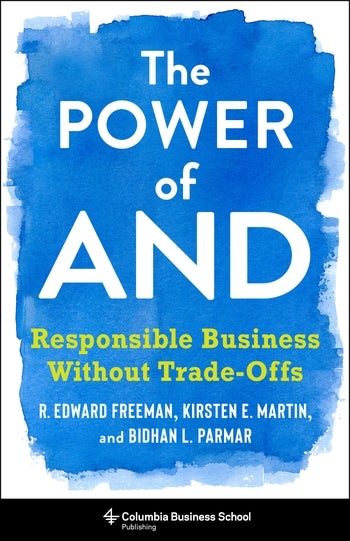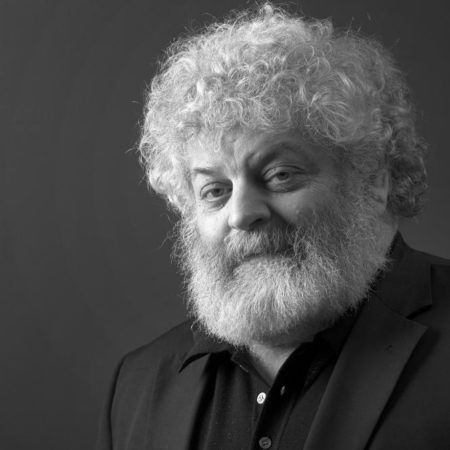Stakeholders or shareholders? Purpose or profits?
Business leaders face many questions, but Professor Ed Freeman would be the first to tell you that the above ones present a false choice.
The UVA Darden business ethics professor has dedicated four decades to persuading CEOs to replace “or” with “and.” His work has advanced stakeholder theory, which holds that companies have a duty to balance the interests of their shareholders with those of their employees, customers, suppliers, and the greater community.
Freeman expands on this idea and more in his 16th book, The Power of And with Bidhan L. Parmar and Kristen Martin, which was released this month. He also advised Fishing With Dynamite, a business documentary that streaming platforms will offer later this month.
EVERFI caught up with Professor Freeman shortly after his latest book’s release. In our conversation, he provided his thoughts on COVID-19, education reform, and stakeholder theory’s recent traction in corporate America.
This interview has been edited for brevity and clarity.

EVERFI: Why did you decide to write The Power of And? Why now? Who is your audience?
Professor Freeman: The audience is executives and managers: people in organizations who are really burdened down with this old story of business, even though they know it doesn’t work.
We’ve all grown up with the idea that business is about money, and that it’s just about the money. That idea needs to be exploded. It doesn’t work anymore. I don’t think it ever did, but certainly, it doesn’t work now. We wrote this book to really try and liberate the people who are in the grip of this story. You don’t have to believe this, it’s not true.
Organizations have stakeholders, you have to be responsible to them, you have to create value for them. Business and ethics go together. Business isn’t automatically unethical. We can be fully human, as well as economic. Businesses are set in society, not just in some mythical free market land. Purpose matters, and of course profits do too. That’s a much more common-sense and realistic idea of what business really is than the idea that you’re only in it to make money for somebody else.
I’m kind of a one-trick pony in that I’ve written versions of this for a long time. But I think this is the best one so far. And I’m getting up there in age, so it’s probably my last shot to do that in terms of a book.
EVERFI: How have your books and articles changed or evolved over the years? How has your thinking about stakeholder theory changed?
Prof. Freeman: Back when I wrote Strategic Management: A Stakeholder Approach [in 1984], I thought you could write books that appeal to both academics and business executives. When I wrote that book I had just received my Ph.D. in philosophy, I was at Wharton as a postdoc, and then as a faculty member. And I was trying to figure out what this thing called business is because I didn’t really have much experience. And it seemed to be pretty obvious that every business I saw created and sometimes destroyed value for customers, suppliers, employees, communities, and the people with money. I was just trying to explain this idea to academics and business people.
I didn’t say much about ethics in that first book because I didn’t know that people separated business and ethics. In 1987 Dan Gilbert and I wrote a book called Corporate Strategy and the Search for Ethics. In that book, we tried to write for business strategists and say, “Hey, stop all this purely economic stuff, and think about how ethics and strategy go together.”
By the time Andy Wicks, Jeff Harrison, and I started to write Stakeholder Theory: The State of the Art [published in 2010], academics had applied the stakeholder idea to fields as broad as public administration education, construction management, project management, as well as strategy and finance and accounting. There are hundreds of people all over the world who are doing work on the stakeholder idea and collecting really advanced data. So I get way too much credit for this.
With The Power of And, we’re trying to figure out how to get stakeholder thinking to a much broader audience. My co-author and former student Bidhan Parmar found a guy named Paul Wagner who had won an Oscar for the documentary film, and they made a documentary called Fishing With Dynamite. That will be released in late June.
It’s a 70-minute film that looks at the differences between companies managed according to shareholder theory and stakeholder theory. The film profiles three companies that have been run on stakeholder lines for some time: Luke’s Lobster (a little small startup), The Container Store, and Eastman Chemical. The film also talks about other stakeholder-driven companies like Whole Foods and Costco as well as some bad actors that have operated in the name of shareholders.
We’re very hopeful that the book and film going together will have a bigger impact than either one of them alone.
EVERFI: The Business Roundtable is an influential trade association that represents over 200 CEOs from the largest U.S. companies. The Roundtable released a statement in 2019 redefining the purpose of the corporation. In the Roundtable’s words, the statement “moves away from shareholder primacy” and “includes a commitment to all stakeholders.” I know you’ve worked with that group in the past. What were your thoughts on that statement?
Prof. Freeman: I was surprised when I woke up one morning and the Roundtable statement on stakeholders was there. It was something I could have written. A lot of people thought I did, but I actually didn’t. They used a metaphor that I think I was the first person to use, that stakeholder interests needed to be harmonized. The “harmonized” metaphor is right because in music the harmony notes are different, but they sound good together, and that’s exactly what you have to do in business.
So I was very pleased. A lot of people said, “Well, they don’t really mean it, they’re just doing this for political cover.” But I don’t think that’s true. If you look at the Just Capital website that measures how companies are doing with respect to stakeholder value creation, they have a website that looks at what companies who signed the Business Roundtable statement are doing with respect to COVID-19. And it’s pretty amazing what they’re doing. Again, not everybody’s doing the right thing, but a lot of them are. And they’re certainly not just oriented toward shareholder value.
So the Business Roundtable statement was one of those things where my fist is pumping in the air cheering them on. I’m certainly not as skeptical as all the pieces in The Wall Street Journal or New York Times are. I’m really happy. Maybe some stuff I did 10-15 years ago helped with that, I don’t really know. But the stakeholder idea now is kind of in the air, and I think that’s great.

EVERFI: It’s definitely in circulation, and your book discusses the pitfalls of skepticism toward companies that express an interest in stakeholder values.
Prof. Freeman: The problem is that people want an idea of the one and only way to run every business all the time in every circumstance, and that’s just a fool’s errand. Business is an incredible, variegated institution. It’s what philosophers would call a “family resemblance” institution. What makes something a business? You know, it’s really hard to say. It’s not just profits, there are lots of other forms of business. So you can’t treat them all alike because they’re not. And that’s what the old story does: it treats them all like and pretends that money is the only thing that matters, and of course that’s just not true.
You [at EVERFI] are not in it for the money. It’s not that you don’t want to make money, but making money is not your purpose. That’s the mistake. It’s like saying, “I’ve got to have red blood cells to live; therefore, the purpose of life is to make red blood cells.” That’s just a logical mistake. But it’s a logical mistake that runs deep in formal economics and runs deep in business theory. And unfortunately, it runs deep sometimes in the thinking of executives and critics and policymakers.
EVERFI: The Power of And offers stories of businesses and leaders who have embraced stakeholder theory throughout the years. Are there any stories that you’re particularly excited to tell?
Prof. Freeman: We had a meeting in the waning days of the Obama administration at the Department of Labor. Tom Perez was the Secretary of Labor, and everybody thought he was going to be the Secretary of Labor for four more years.
The meeting brought together all these people who were arguing for these new models or brands of business—”just capital,” “conscious capitalism,” “connected capitalism,” “inclusive capitalism,” “ESG investing,” “impact investing,” you name it. We were all there to talk about how to change the underlying story of business faster. Everyone was focused on the question, “What’s the right brand of all these things?” Of course, everybody thought their brand was the right brand.
As I was sitting there listening to this, it became clear to me the more interesting question was, “Regardless of what the brand is, what are the four or five issues or problems we have to solve?” And that’s what we tried to articulate in The Power of And, that you had to have purpose and profits, stakeholders and shareholders, business and ethics, humanity and economics, and society and markets. Whatever the brand is, you have to deal with those five things.
My co-authors and I started looking at companies and what they were doing. We looked at CarMax who, in a sense, revolutionized the used car market, which had the worst ethical reputation of any business in the world. They revolutionized that market by, essentially, adding ethics to the process of how they buy and sell cars. We also looked at commerce companies like Whole Foods, Costco, and The Container Store. We looked at this little investment company in Alexandria called The Motley Fool. We also talked to companies like New York Life, which we profiled in the last chapter and companies that some of our students had started, like Lending Tree, which was started by a Darden student.
What we found was that there were a bunch of people out there trying to change the world through business. That’s what business is — that’s what your company [EVERFI] does. That’s what all the entrepreneurs in the education space are doing. Same in pharma: even though they have the worst PR around if you look at the hundreds of companies that have jumped into the COVID-19 space. Medtronic has given away its patents on ventilators, and it’s also given away its manufacturing processes so that they help other people figure out how to make them. We finished the book before COVID-19, so those stories are not in there. But there’s another book worth of stories just on the things companies have done to do their part on the virus.

EVERFI: Your book describes the Great Recession as a major inflection point in companies’ thinking. Do you have any predictions for how COVID-19 will affect companies’ approach to stakeholders two, three or five years out from now?
Prof. Freeman: I think if you look at the Great Recession, we’re still dealing with the outcomes 10 years later. In 2009, it was not clear exactly how business and policy worked [together]. We eventually got rid of the unemployment that it caused, and of course, we think the Great Recession was caused in part because of this mania for shareholder value. But if you add to that the coming crisis people see in global warming and you add to the studies that show that more people are disengaged in their work — the Gallup studies show that in the US 70% of people are unengaged or actively unengaged — and if you look at the trust in business, those numbers are not pretty. Add to that COVID-19, and you get a perfect storm.
We will not work our way out of this with business as usual. It absolutely can’t happen by just focusing on the money. I think what business has is the opportunity to show that it can create value for all of its stakeholders and thrive financially. In fact, I would argue that’s the only way it’s going to happen here.
People say you shouldn’t waste a crisis. Well, I don’t want to waste this one. I don’t want companies to go back and say, “You know, really only shareholders count,” or on the other hand, going and saying, “Shareholders don’t count.” It’s an “AND.”
We love to frame things as impossible choices, but the fact is, you [at EVERFI] want to change the world of education in K-12, and you want to make enough money so you can do that. That’s not very different from how most companies start. Sometimes they forget it, and the means become the ends, but you can recover from that. You look at a company like Unilever: 400 brands around the world. It’s been a rocky road, but they’ve measured each of their brands, now, in terms of their effect on the Sustainable Development Goals. That’s a big change in processes and systems in the day-to-day life of executives there.
EVERFI: Why do you think employees are increasingly disengaged in their work?
Prof. Freeman: I think large businesses can be really stupid. I think managers can lose faith, and it’s the old story: if I think my job exists just to make money for shareholders, that really doesn’t get me out of bed. If I have some sense of purpose in what we’re doing, it’s different. I’m lucky I work for an institution whose purpose is front and center every day: we want to develop and inspire responsible business leaders to change the world. The more I can keep that purpose front and center, the more I can overlook the stupid stuff because every organization does stupid stuff. Or at least, I’ve never seen one that didn’t.
It’s not just “do stupid stuff” — I’m saying that to be funny — but organizations make mistakes. We need to avoid “saints and sinners” thinking. Oscar Wilde is a hero of mine. He said, “Every saint has a past, every sinner has a future.” I don’t know any saints, but I also don’t know any people that are sinners, in the sense that their only concern is maximizing their short-term economic self-interest. There are people like that, but we call them sociopaths.
The saints and sinners’ thinking permeates the way we think about business ethics. People tend to think about ethics as always only caring about other people and being willing to self-sacrifice, but that’s not right. We have to take care of ourselves as well. We have a duty to self to maximize our own potential. Anyone who’s ever had a child or who’s ever been in love knows we’re self-interested and other-regarding at the same time. This idea that we focus on our short-term economic self-interest is just not a very useful way to think about human beings.
EVERFI: How have you seen companies effectively engage with that segment of the community that lies outside their investors and employees?
Prof. Freeman: There are lots of different kinds of value that businesses create: economic, social, political, moral, spiritual. I don’t really care how you divide that up, what I care is that businesses have a relationship with stakeholders so that they’re creating as much value as they can and it’s reciprocal.
Some people say, “Stakeholder theory is a way to do corporate social responsibility,” but I have always insisted, “No, it’s a way to do business.” It’s a way to look at the business model as a whole. Your business model as a whole is, “What’s your purpose?” How do you create value for your stakeholders? How does creating value for one stakeholder create value for another? Where are the systems and processes that you have in place to make that routine? Because purpose doesn’t live in the purpose statement or the vision statement. Purpose lives in the systems and the processes inside the organization. That’s how you can tell if an organization is serious or not.
So, let me give an example of a company I think does really well, and that’s Whole Foods. Whole Foods understands its purpose to try to heal people on the planet and have people eat in a more healthy way.
One thing Whole Foods does is it has a foundation called Whole Planet Foundation that gives microloans to companies that are in their suppliers’ communities and to their suppliers. They have 100,000 suppliers all over the world, but they understand that if their suppliers are healthy business communities, they will be better suppliers. It’s a win-win thing.
Whole Foods has another foundation called Whole Cities. Whole Cities provides food access and nutrition education to food deserts in cities like Detroit and the Ninth Ward in New Orleans, and some others. They also have another foundation called Whole Kids. Whole Kids sponsors salad bars and gardens in elementary schools.
So, what they’re trying to do is make society better, make their local communities better by doing things that they have some expertise in. It’s not, “Let’s give money to the opera.” I mean, there’s nothing wrong with philanthropy, but I think their approach is much more powerful. It connects into what they know how to do and it connects into their purpose.
EVERFI: How can companies make a difference in education?
Prof. Freeman: There’s so much innovation in the education space. There are a lot of people trying a lot of stuff. And then it gets to a point where somebody tries to scale it. And it usually doesn’t work. One of the reasons for that is, there are so many education systems in the US. There’s not a one-size-fits-all approach. I’ve learned to value the experiments that are going on and to realize that they’ll scale in some places and they won’t in others.
We have a program here at Darden, where we work with schools that are low performing. It’s called a turnaround program. And you see a lot of teachers that have been demonized. You know: “Teachers are overpaid; they have tenure, and they don’t care because there’s no incentive.” I’m sure there are some bad actors, but I have yet to meet a teacher who doesn’t want to go to the classroom and do their best to help their kids succeed. Some of them may be burned out, and some of them may be frustrated by the bureaucracy and by the inability to change. But you don’t go into teaching unless you’re committed to having the best outcomes you can for the kids.
So when I see teachers demonized, that’s a hard thing, that’s a hard thing for me to deal with. Now, unions permit change sometimes, but as a CEO friend of mine says about unions in private businesses, “Why do you need a union to tell you to do what’s best for your employees?” If there’s a union between you and your employees, that’s your fault because you haven’t figured out how to have a win-win with your employees, and you need unions to have win-wins. And that’s a sad commentary on the way we think about management and leadership.
So somehow in education, we have to get past the demonization and the politicization of the issues here and figure out how to have more of these win-win-wins. I think the only way to do that is through companies like yours. Then we need more of them. What matters is that you keep pushing on and adapting and figuring out where it works.
EVERFI: Any final thoughts?
Prof. Freeman: We need to be the generation that makes business better. And there’s nothing to polish it.
We have something called the Entrepreneur’s First Rule: you critique something by creating something better. We’re changing the way this business works, and we’re going to change the way the world works. I hope sometime in the future, my grandchildren’s grandchildren will say, “What’s up with back in the day when they thought the only things that mattered were shareholders and money? What were they smoking so they thought that?”
We know business is better. We know it’s how we create value for each other and how we cooperate. And we need to acknowledge it so that we can improve.


